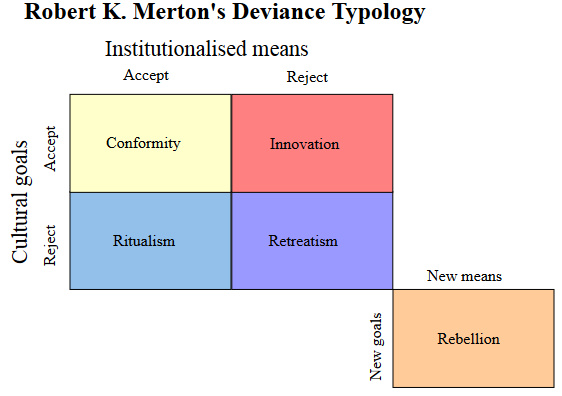Imagine a young man, raised in a poverty-stricken neighborhood, dreaming of becoming a successful entrepreneur. He sees the glamorous lives of wealthy business owners on television, their opulent lifestyles a stark contrast to his own. He’s driven by ambition, fueled by a societal message that anyone can “make it” with hard work and dedication. But what happens when he realizes the path to success is blocked by a lack of education, limited opportunities, and systemic inequalities? This is the essence of what Robert Merton’s Anomie Theory explores: the conflict between culturally prescribed goals and the legitimate means to achieve them.

Image: dustinstoltz.com
Robert Merton’s Anomie Theory is a sociological framework that helps us understand how societal pressures and frustrations can lead individuals to engage in deviant or criminal behavior. It’s a powerful lens through which we can analyze the causes of crime and social unrest, offering valuable insights into the complexities of human behavior.
The Seeds of Anomie: When Goals and Means Clash
At its core, Anomie Theory posits that when individuals are unable to achieve their culturally defined goals through legitimate means, they experience a state of anomie, a sense of normlessness or disconnect from societal values. This disconnect can manifest in various ways, leading to different forms of deviant behavior.
Merton identified five modes of adaptation to this strain between goals and means:
-
Conformity: This is the most common adaptation, where individuals accept both the cultural goals and the legitimate means to achieve them. They strive for success through hard work, education, and other socially acceptable paths. Think of the aspiring entrepreneur who works tirelessly to build their business through legal and ethical means.
-
Innovation: Individuals who choose this mode accept the societal goals but reject the traditional means. They find alternative, often illicit, methods to achieve success. Our young man from the previous example might resort to criminal activity, engaging in drug dealing or other illegal ventures to attain wealth and status.
-
Ritualism: This adaptation involves abandoning the cultural goal of success but adhering to the legitimate means. Individuals engaged in ritualism focus on the process rather than the outcome. This might manifest as someone who diligently follows the rules, going through the motions of their job but feeling disillusioned and detached from the bigger picture.
-
Retreatism: Here, individuals reject both the cultural goals and the legitimate means. They withdraw from society, often seeking solace in substance abuse, escapism, or social isolation. This could be seen in individuals who turn to drugs or alcohol to cope with the overwhelming pressure of achieving societal expectations.
-
Rebellion: This adaptation involves rejecting both the goals and the means and striving to replace them with new alternatives. This might involve actively participating in social movements, protesting against the established system, or attempting to create a new societal order.
Real-World Implications: Exploring the Anomie Effect
Merton’s Anomie Theory has profound implications for understanding various social phenomena. For example, it helps explain why crime rates are often higher in disadvantaged communities. Limited access to education, employment opportunities, and economic resources creates a significant gap between aspirations and realities, putting individuals at risk of adopting deviant behaviors as a means to achieve their desired outcomes.
The theory also provides insights into the high rates of drug addiction and substance abuse in marginalized communities. When opportunities for social mobility and economic advancement are blocked, individuals may turn to drugs as a way to escape the frustration, despair, and anomie they experience.
Furthermore, the theory sheds light on why certain social groups are more prone to engaging in acts of violence and rebellion. When individuals feel alienated from the mainstream, their sense of belonging and purpose erodes, making them more likely to seek fulfillment through violent acts or radical movements.
Navigating Anomie: Understanding the Individual and the System
While Anomie Theory highlights the societal factors that contribute to deviant behavior, it’s crucial to recognize the role of the individual in shaping their own responses. Some individuals, despite facing systemic challenges and disadvantages, remain resilient and navigate their circumstances with integrity. Their ability to find meaning and purpose, coupled with a belief in their own agency, allows them to resist anomie and forge a positive path.
However, the theory also reminds us of the importance of addressing the systemic issues that fuel anomie. Promoting social justice, ensuring equitable access to opportunities, and fostering a sense of belonging within communities can create a more cohesive and just society, thereby reducing the risk of individuals succumbing to anomie.

Image: dokumen.tips
Robert Merton Anomie Theory
Beyond Theory: Building a More Equitable Society
Merton’s Anomie Theory serves as a reminder that social structures and individual experiences are intertwined. It prompts us to question the ways in which societal goals and expectations can create pressure and conflict, leading individuals to deviate from accepted norms.
To address the challenges presented by Anomie, we must work towards building a society that offers equal opportunities for everyone and fosters a sense of community, shared values, and belonging. By promoting social justice, addressing systemic inequalities, and investing in individuals’ well-being, we can create a world where everyone has the opportunity to fulfill their potential and live a life of purpose and meaning.
As you reflect on Merton’s Anomie Theory, consider how these concepts resonate with your own life experiences and the world around you. What are the societal pressures you face? How do you navigate the challenges of striving for success in a complex and often unequal world?



/GettyImages-173599369-58ad68f83df78c345b829dfc.jpg?w=740&resize=740,414&ssl=1)


